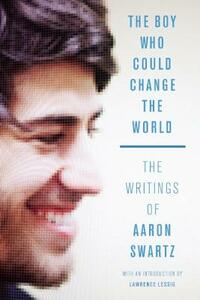You need to sign in or sign up before continuing.
Take a photo of a barcode or cover
An incredibly compelling, deeply moving and ultimately disturbing book. It's compelling on two distinct levels: first, the content of Aaron's thoughts - the clarity of his vision, his impressively singular focus on a moral north star, his intelligence and passion - and, second, the "meta" of Aaron himself. I read this and then immediately this piece by the New Yorker, and I want to watch the documentary now as well.
A bit of personal background: I worked at MIT from 2010-2013. MIT has a long, respected tradition of "hacks" - i.e. pushing (legal) boundaries to make political points or have fun (e.g. putting a police car on the dome). The wifi at MIT is free and open - if you're somewhere near Kendall Square in Cambridge, you will get access to MIT's network, and thus access to JSTOR and all the paywalled academic articles. So, as Aaron would say, if you're wealthy and live in the 02139 zip code, you have access to top scientific articles for free. If you live in Accra or Bogota or Dar es Salaam, you do not.
Anyway, at MIT there's a general vibe of "hacker counter-culture" (Richard Stallman hangs around at CSAIL, apparently refusing to use the key fobs to enter buildings since they can be tracked). So Aaron's action was, in my 2010 view, a completely normal and unremarkable "MIT hack" that was a bit more political, but making a generally benign/admirable point (paywalled academic articles are absurd, after all).
This is all to say that the Federal prosecution of Aaron has been rightly criticized for being so anti-human and dystopian.
Anyway, about this book: I felt like I knew the "story" already - but I found this book still so surprising because, (a) I didn't realize Aaron touched SO MANY things I consider important (and even use frequently!) like Markdown (!), RSS (!), Reddit (!) and (b) I felt like I got a much better (but still incomplete, no doubt) picture of who Aaron was as a person. I was amazed and inspired by his absolute clarity of thought: his posts on governance, corruption, copyright, education (!) are righteous and true. They just make sense. But I was also bummed by the "darker" patterns: his absolute conviction which felt like moral perfectionism, his humorlessness, the intensity of his righteousness. And I was irked by some of the "brilliant young dude" traits like his worshipping of David Foster Wallace and Noam Chomsky, and his - like Cory Doctorow - sometimes condescending explanation of econ principles.
But! Honestly, those flaws just enriched this whole reading, since they made Aaron seem more human and imperfect, and therefore made his achievements even more impressive.
A bit of personal background: I worked at MIT from 2010-2013. MIT has a long, respected tradition of "hacks" - i.e. pushing (legal) boundaries to make political points or have fun (e.g. putting a police car on the dome). The wifi at MIT is free and open - if you're somewhere near Kendall Square in Cambridge, you will get access to MIT's network, and thus access to JSTOR and all the paywalled academic articles. So, as Aaron would say, if you're wealthy and live in the 02139 zip code, you have access to top scientific articles for free. If you live in Accra or Bogota or Dar es Salaam, you do not.
Anyway, at MIT there's a general vibe of "hacker counter-culture" (Richard Stallman hangs around at CSAIL, apparently refusing to use the key fobs to enter buildings since they can be tracked). So Aaron's action was, in my 2010 view, a completely normal and unremarkable "MIT hack" that was a bit more political, but making a generally benign/admirable point (paywalled academic articles are absurd, after all).
This is all to say that the Federal prosecution of Aaron has been rightly criticized for being so anti-human and dystopian.
Anyway, about this book: I felt like I knew the "story" already - but I found this book still so surprising because, (a) I didn't realize Aaron touched SO MANY things I consider important (and even use frequently!) like Markdown (!), RSS (!), Reddit (!) and (b) I felt like I got a much better (but still incomplete, no doubt) picture of who Aaron was as a person. I was amazed and inspired by his absolute clarity of thought: his posts on governance, corruption, copyright, education (!) are righteous and true. They just make sense. But I was also bummed by the "darker" patterns: his absolute conviction which felt like moral perfectionism, his humorlessness, the intensity of his righteousness. And I was irked by some of the "brilliant young dude" traits like his worshipping of David Foster Wallace and Noam Chomsky, and his - like Cory Doctorow - sometimes condescending explanation of econ principles.
But! Honestly, those flaws just enriched this whole reading, since they made Aaron seem more human and imperfect, and therefore made his achievements even more impressive.
hopeful
informative
inspiring
reflective
medium-paced
even though it took me a lot of time to finish it (I wanted to do it in one sitting, it seemed feasible) I kinda know why I staggered. This book is a heavy load, it makes you sad because it reminds you or spills the light on the reality we live in. He wanted to want to care less, that's for sure. bad luck for someone who has his type of mind.
I absolutely loved the two biggest pieces in the book (on how congress works and about school). They are must-read i think for those interested.
I absolutely loved the two biggest pieces in the book (on how congress works and about school). They are must-read i think for those interested.
This book consists of a set of essays written by Aaron Swartz from the age of 14 until his suicide 12 years later, and published on various blogs.
The subject matter Swartz tackles is wide ranging, covering political activism in the internet age, education policy, the internet as a collaboration tool, the uses of computers among others. Each set of essays is presented with a brief introduction by someone who knew Swartz, essentially presenting a group of eulogies to his life and work.
Unfortunately although it is clear that Swartz had a great impact on these people the book itself feels incoherent. Although the grouping of the essays is logical, it doesn't give any sense of the development of Swartz's thought. It is clear that he was an intelligent person with an interest in many subjects who read widely, but what is missing in this collection is a thread to draw it all together.
The sections that feel the most cogent are those in which Swartz talks about his work on Wikipedia. The rest feel a little too much like he was read fairly briefly across a topic and written his thoughts down. Swartz hopes that widespread blogging will do a better job of disseminating the truth than the mainstream media, but I'm not convinced that his own work as presented in this book demonstrates that.
His political writing feels most superficial of all, the work of an undergraduate student. That's not a criticism - at the time he wrote most of these essays that's exactly what Swartz was - but it does mean that his thinking is not as insightful as the writers who introduce it like to pretend. He comes across as an interesting, thoughtful, politically active young man, but not perhaps a genius or someone who could 'change the world' as the title claims.
The subject matter Swartz tackles is wide ranging, covering political activism in the internet age, education policy, the internet as a collaboration tool, the uses of computers among others. Each set of essays is presented with a brief introduction by someone who knew Swartz, essentially presenting a group of eulogies to his life and work.
Unfortunately although it is clear that Swartz had a great impact on these people the book itself feels incoherent. Although the grouping of the essays is logical, it doesn't give any sense of the development of Swartz's thought. It is clear that he was an intelligent person with an interest in many subjects who read widely, but what is missing in this collection is a thread to draw it all together.
The sections that feel the most cogent are those in which Swartz talks about his work on Wikipedia. The rest feel a little too much like he was read fairly briefly across a topic and written his thoughts down. Swartz hopes that widespread blogging will do a better job of disseminating the truth than the mainstream media, but I'm not convinced that his own work as presented in this book demonstrates that.
His political writing feels most superficial of all, the work of an undergraduate student. That's not a criticism - at the time he wrote most of these essays that's exactly what Swartz was - but it does mean that his thinking is not as insightful as the writers who introduce it like to pretend. He comes across as an interesting, thoughtful, politically active young man, but not perhaps a genius or someone who could 'change the world' as the title claims.
"What a great mind we have lost". That is the first thing it came to my mind when I finished the last paragraph of this compilation of Aaron's writings. Not only was an outstanding programmer (RSS, web.py, Reddit, etc), but a humble human being who dare to think different and go against the stream and construct an independent view on politics, media, culture, education, etc.
If you don't know who he was, this book is a pretty good way to get started on his views: what the independent internet counter culture is, and independent thinking is like.
If you don't know who he was, this book is a pretty good way to get started on his views: what the independent internet counter culture is, and independent thinking is like.
informative
inspiring
reflective
medium-paced
hopeful
informative
inspiring
medium-paced
I noticed (and pre-ordered) this book after trying to find a specific entry I read a while ago on Swartz's blog, and I'm glad I did. Although I had read some of the book's included entries before, I was happy to see that it reproduced some previously unpublished, longer essays that Swartz gave as seminars or talks. The editors helpfully categorized his writings into headings (e.g. "Free Culture," "Politics," and "Media") and recruited various writers, thinkers, and friends of Swartz to frame the sections, which they introduced in order to give context to his writings.
As for the content itself, I loved Swartz's writing from start to finish. He had a prescient view on many aspects of internet culture. As a small example, he suggested in 2006 (age 19) in an essay about Wikipedia that for allegations of a non-neutral point of view, "a notice saying neutrality was disputed could appear on the top of the page until the complaint was properly closed" (Swartz 47) which has since been implemented. The date and year he wrote each essay is included under each title, and most of the essays are short (a page or so front and back), easily digestible but with plenty of jumping-off points for further consideration and research on the reader's part.
I would recommend this book to anyone with an interest in technology, politics, and how they intersect, as well as anyone who would like a closer look into the life of Aaron Swartz, a remarkable person who the planet lost much, much too soon.
As for the content itself, I loved Swartz's writing from start to finish. He had a prescient view on many aspects of internet culture. As a small example, he suggested in 2006 (age 19) in an essay about Wikipedia that for allegations of a non-neutral point of view, "a notice saying neutrality was disputed could appear on the top of the page until the complaint was properly closed" (Swartz 47) which has since been implemented. The date and year he wrote each essay is included under each title, and most of the essays are short (a page or so front and back), easily digestible but with plenty of jumping-off points for further consideration and research on the reader's part.
I would recommend this book to anyone with an interest in technology, politics, and how they intersect, as well as anyone who would like a closer look into the life of Aaron Swartz, a remarkable person who the planet lost much, much too soon.
There was some good content in here, and some that I'm less sure about. Some of the areas the book covered, economics for example, are less familiar to me so I don't know enough to dispute the author on them. Where this book lost points for me was towards the end when Swartz got into writing about education. He had some valid criticism on the way modern schools operate with over-reliance on testing and potential stifling of creativity. But, he was completely wrong on the history of public schools in the US. He claimed that the first public schools were created to turn children into compliant factory workers in the 1830s, and that's just not true. His critiques of education throughout history stemmed from this false information, it seems to me like that makes his conclusions on education suspect. It also makes me wonder what else he got wrong.
So, there was some interesting material here, but readers should take it with a grain of salt.
So, there was some interesting material here, but readers should take it with a grain of salt.
I noticed (and pre-ordered) this book after trying to find a specific entry I read a while ago on Swartz's blog, and I'm glad I did. Although I had read some of the book's included entries before, I was happy to see that it reproduced some previously unpublished, longer essays that Swartz gave as seminars or talks. The editors helpfully categorized his writings into headings (e.g. "Free Culture," "Politics," and "Media") and recruited various writers, thinkers, and friends of Swartz to frame the sections, which they introduced in order to give context to his writings.
As for the content itself, I loved Swartz's writing from start to finish. He had a prescient view on many aspects of internet culture. As a small example, he suggested in 2006 (age 19) in an essay about Wikipedia that for allegations of a non-neutral point of view, "a notice saying neutrality was disputed could appear on the top of the page until the complaint was properly closed" (Swartz 47) which has since been implemented. The date and year he wrote each essay is included under each title, and most of the essays are short (a page or so front and back), easily digestible but with plenty of jumping-off points for further consideration and research on the reader's part.
I would recommend this book to anyone with an interest in technology, politics, and how they intersect, as well as anyone who would like a closer look into the life of Aaron Swartz, a remarkable person who the planet lost much, much too soon.
As for the content itself, I loved Swartz's writing from start to finish. He had a prescient view on many aspects of internet culture. As a small example, he suggested in 2006 (age 19) in an essay about Wikipedia that for allegations of a non-neutral point of view, "a notice saying neutrality was disputed could appear on the top of the page until the complaint was properly closed" (Swartz 47) which has since been implemented. The date and year he wrote each essay is included under each title, and most of the essays are short (a page or so front and back), easily digestible but with plenty of jumping-off points for further consideration and research on the reader's part.
I would recommend this book to anyone with an interest in technology, politics, and how they intersect, as well as anyone who would like a closer look into the life of Aaron Swartz, a remarkable person who the planet lost much, much too soon.





